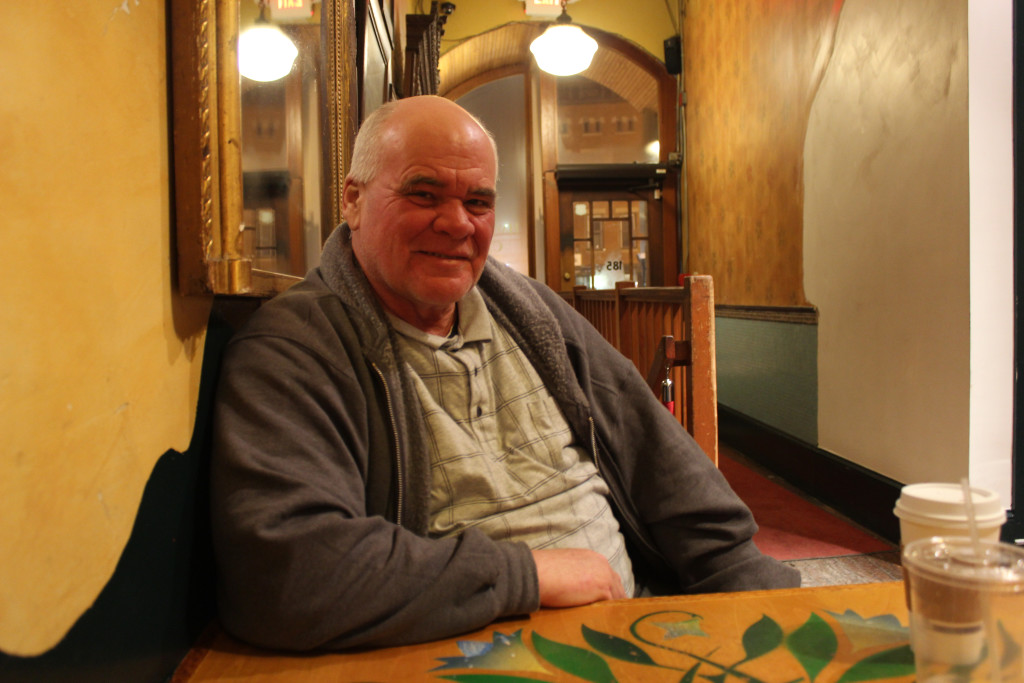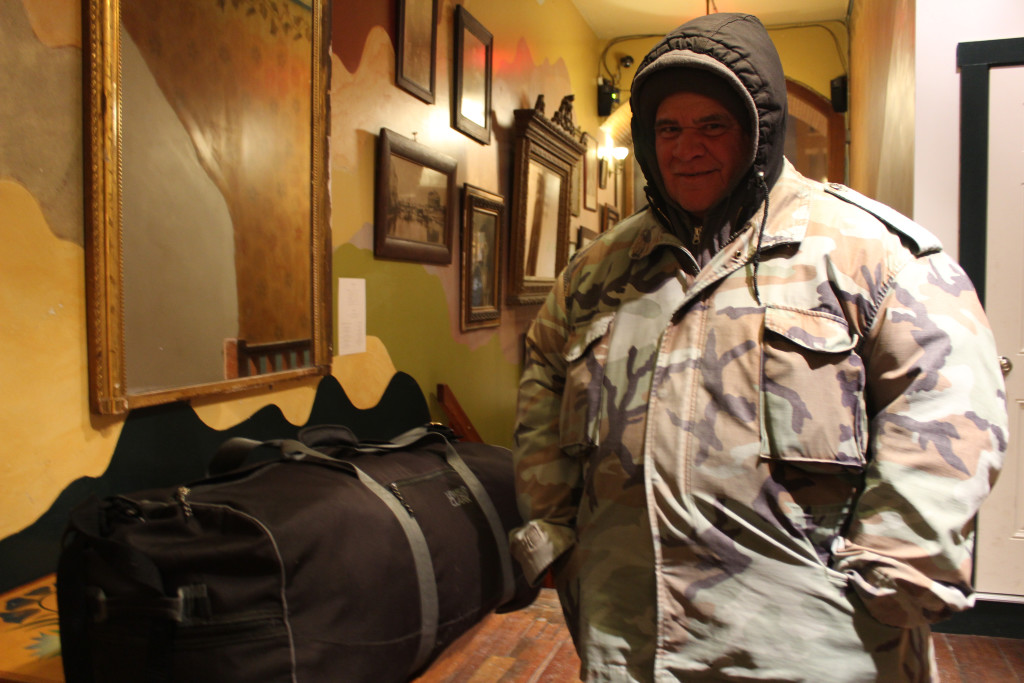The first snowflakes begin to fall Monday night. It’s my cue to head into the gusty blizzard, geared with elbow-high gloves and the coziest scarf I could find, in search of the city’s homeless. How are they faring, outside in this storm?
I walk several frosty laps around downtown. The usual faces are nowhere to be seen. I follow a homeless man inside the Interfaith Cot Shelter on Center Street and find a packed common room — it’s the shelter’s check-in hour and there aren’t enough seats in the lobby to go around.
Back outside and losing feeling in my fingers, I walk around the corner in search of a hot beverage to hold. A large man wearing a hooded camouflage jacket stands in front of Haymarket in Northampton. He asks as I pass, “Do you have a cigarette?” I tell him I don’t smoke.
I’m craving a green tea latte from Starbucks so I continue around the bend. After waiting in line and retrieving my sweet, milky treat, I see the man who asked for a cigarette hasn’t moved. There’s a massive duffel bag laying next to him.
Are you heading to the shelter tonight, I ask. “I don’t go to the shelters. I have a spot,” he says matter-of-factly.
Paul Chandler, 56, has been homeless for “six winters.” “I count it by the hard parts,” he says.
“It’s a fight,” he says of being homeless. “You’re always fighting to turn your life around. You can’t have anything on the streets — you can’t date, eat out, dress nice. I have no comforts. That’s what’s hurting my health — not being able to lie down, get warm, eat right. Everything is fucking impossible. Everything is so fucking hard.”
Even though he has his issues with the other homeless people in town, referring to their “self-inflicted wounds,” Paul says, “nobody deserves this.”
He says the lifestyle is dangerous, even in Northampton. He will wake up in the middle of the night to sucker punches in the face from roving gangs of teenage boys, drunken college students and other homeless people.
Our conversation is rich with survival tips, like insulate your sleeping space with paper, make sure it’s dry and wear thermal underwear. Paul says his military service prepared him to handle being outside in the harsh elements. He was an Army combat engineer, he says, so he was always in the field.
A drywaller since he was 16, he says he’s always lived paycheck to paycheck. Work became increasingly less available as the recession progressed and Paul started to lose things in “domino-effect” fashion — his possessions, his home, his car.
Paul says he’d rather be outside, living on his own terms than deal with the people inside Northampton shelters. He says he doesn’t like to be around the culture of addiction, that it breeds trouble and that many of Northampton’s homeless are addicted to some substance or another. He says there is no weather so extreme that he resorts to the shelter, recalling a hurricane “a couple summers back” that people were worked up about, during which he sat on his favorite bus-stop bench in front of Pulaski Park without incident.
As we sit at a table in Haymarket moments after meeting, Paul takes out a box of pills from a large Ziploc bag and makes a multi-colored pile on a napkin. He’s been in and out of the hospital, he says, for edema. He says the disease, marked by excess fluids that collect from too much time spent sitting, stems from his homeless lifestyle. In addition to causing an obvious limp, he says, the edema has also landed him with atrial fibrillation.
“You can’t live like this and not have something go wrong,” says Paul.
For Paul, a man who disapproves of wandering — he says he’s “one of those people” who needs a routine, to “know what [he’ll] be doing” — every day has a structure. It starts with a coffee at Dunkin’ Donuts. He brushes his teeth in the bathroom then heads to Forbes Library where he spends a large chunk of the day reading and using the computer. Then it’s off to Haymarket until the cafe closes at 9:30 p.m. He sips coffee slowly, stepping outside for periodic puffs on a cigarette — likely one provided to him by a Haymarket staffer. “They’re good to me here,” he says.
I ask Paul to show me his gear. His duffel bag is too heavy to lift — for me, at least. He unzips the bag and reveals individual parcels, each wrapped in plastic to withstand the elements. “These are crucial,” he says, lifting out a package of baby wipes. It can be difficult, he says, finding bathrooms to use. The key to not getting kicked out of bathrooms in downtown businesses is not to draw attention to yourself.
“You have to learn to be invisible,” he says.
During the winter, Paul spends no more than eight hours a day outside. And those hours are strategically planned around thawing moments inside places like coffee shops, laundromats and the library.
“Tylenol and caffeine — they become your lifeblood,” says Paul.
In 1999, after serving five years of a three-to five-year sentence in state prison for child molestation and rape — a crime he says he did not commit — the Brooklyn native moved to Northampton. Paul is listed as a Level 3 sex offender by the state.
Even with his military background, he says, his first nights on the streets were frightening. He grew accustomed to the homeless lifestyle, he says, but prays he’ll find work and a home.
Paul says that building a relationship with God has been his saving grace. He takes the bus to the Seventh Day Adventist church in Florence for Tuesday prayer meetings and Sunday worship.
“I’m one of those people that doesn’t miss church, because God’s all I got. And it’s been more than enough — hasn’t let me down yet.”
Drinking coffee, smoking cigarettes and eating meat, he says, do enough to make him a “problem child” in the eyes of the church. But he says he doesn’t have any drug or alcohol addictions. For one, he couldn’t afford it and secondly they are not in keeping with the way of the church, he says.
Paul says he gets a $200 pension every month and — aside from soup kitchens and stray cigarettes — he does not accept handouts. He admonishes many of the homeless in Northampton for panhandling on top of government checks, spending the money on “unnecessary” items and addictions.
“Only God could help me at this point,” he says. “I don’t even have the clothing to get back to work. It’s like I just arrived on this planet. It’s going to take a miracle. The odds are stacked against me, but I’d rather die on my feet than lying down.”
***
With three of Paul’s blankets — which he carefully unfolded from his bag — tucked around me on a bus stop bench downtown, Monday’s late evening winds and their complicit crystals of ice and snow start to feel like needles whipping my cheeks.
He’s insists that I try out his spot. “Dont worry,” he says. “I keep everything really clean.”
This bench is where Paul sleeps, usually in about two-hour increments. He lays newspaper down along the wooden panels, then he places a blanket over the newspaper. His heavily soled work boots are thick enough, he says, that his feet won’t freeze from hours of his feet touching the snow-covered ground.
My first mistake, Paul says from underneath five layers, as I shiver: not wearing thermals. How could I be a New Englander and not wear thermals during the winter? Secondly, he says, I need to tuck myself in better and curl my face downward to block the wind and so my breath and body heat serve as a furnace.
“Don’t get me wrong,” he says, referencing his upbeat tone. “This sucks.”
Once I can no longer feel my face and see the blizzard kicking up, I hand the blankets back to Paul. We stand side by side, looking out at the swirling winds and the sea of white. He asks, in earnest: “Will you make it home OK?”
As I hurry home against the wind, my scarf covered with snow and the cold water dripping down my neck and inside my jacket, I can’t imagine spending another moment outside. In my Northampton apartment, I sit thawing my numb cheeks. Heating pads and tea in hand, I can’t stop thinking about Paul’s last question.
Tossing and turning to the rhythm of the howling wind, at around 3 a.m. I sit up and look out my bedroom window at the white snow whirling around the faint, orange glow of the street lamp and knowing, very well, there are people sleeping in the blizzard tonight.




